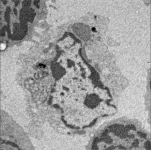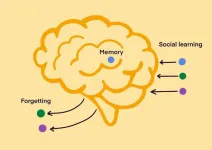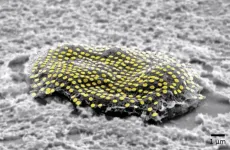(Press-News.org) WASHINGTON, D.C. - Today, the U.S. Department of Energy (DOE) announced $4.7 million in funding for five new research projects in computational biology. These projects will develop new software and analytical tools to manage the growing quantities of genomics and other data stemming from the study of microbes and other biological systems.
“The Biological and Environmental Research (BER) Genomic Science program is at the forefront of using genome-enabled approaches to identify the basic principles that drive biological systems underlying functional processes of organisms,” said Todd Anderson, DOE Acting Associate Director for BER. “To gain insight into the innerworkings of these organisms and their biological systems so we can better understand and utilize them for beneficial purposes, we need to develop advanced computational approaches that connect these tremendously large and diverse data sets along with their data structures and procedures.”
BER’s Genomic Science Program supports fundamental systems biology research on microbial and plant systems to fully understand how plants, microbes and their communities transform and are transformed by the environment, drive the Earth’s biogeochemical cycles, can be harnessed to improve the environment, and provide sustainable routes for energy production and security. This requires a multiscale understanding of biological functions from molecular to ecological scale and can produce vast quantities of data. These projects will help tease out information from that data through new computational approaches.
The projects were selected by competitive peer review under the DOE Funding Opportunity Announcement for Integrative Computational Tools for Systems Biology Research.
Total funding is $4.7 million for projects lasting up to 3 years in duration, with $4.7 million in Fiscal Year 2023 dollars. The list of projects and more information can be found on the BER homepage.
Selection for award negotiations is not a commitment by DOE to issue an award or provide funding. Before funding is issued, DOE and the applicants will undergo a negotiation process, and DOE may cancel negotiations and rescind the selection for any reason during that time.
END
Department of Energy announces $4.7 million for research on integrative computational tools for systems biology research
Projects will develop new ways to manage and use growing datasets
2023-08-07
ELSE PRESS RELEASES FROM THIS DATE:
Tiny, flexible spinal probe system could lead to better therapies
2023-08-07
HOUSTON – (Aug.7, 2023) – The spinal cord is harder to access and study than even the brain. The challenges posed by its mobility and anatomical structure have made understanding exactly how it functions difficult.
Rice University engineers will work with collaborators to optimize an array of nanoelectronic threads, or NETs ⎯ already used successfully for gathering high-fidelity, long-term data from neurons in the brain ⎯ for use in the spine, supported by a $6.25 million, four-year grant from the National Institutes of Health.
In addition to neuronal activity recordings, NET probes can provide tunable, localized stimulation of adjacent neurons. Rice ...
Advancing environmental justice research and student engagement in energy
2023-08-07
HOUSTON, Aug. 7, 2023 – The Baker Hughes Foundation announced a $100,000 grant to the University of Houston Energy Transition Institute (ETI) to support environmental justice research and workforce development programs.
The institute, which focuses on the creation and use of reliable, affordable, environmentally responsible energy for all through a just and equity-driven pathway, is looking forward to using the grant to amplify its mission.
“Thanks to the generous support of the Baker Hughes Foundation, the UH ...
Carbon dioxide – not water – triggers explosive basaltic volcanoes
2023-08-07
ITHACA, N.Y. – Geoscientists have long thought that water – along with shallow magma stored in Earth’s crust – drives volcanoes to erupt. Now, thanks to newly developed research tools at Cornell, scientists have learned that gaseous carbon dioxide can trigger explosive eruptions.
A new model suggests that basaltic volcanoes, typically located on the interior of tectonic plates, are fed by a deep magma within the mantle, stored about 20 to 30 kilometers below Earth’s surface.
The research, which offers a clearer picture of our planet’s deep internal dynamics and composition, with ...
Inside job: Finding exposes unexpected killer of immune cells lacking self marker
2023-08-07
Researchers at Kobe University discovered an entirely new and unexpected mechanism by which the immune system can get rid of cells lacking molecules that identify them as part of the self in mice. The finding, published in PNAS, has possible implications for cancer treatment.
The immune system comprises many types of cells that work together to fight off diseases. Two important types are dendritic cells and T cells. Dendritic cells are located in strategic positions throughout the body including the gut and skin, as well as in the lymph nodes, sample their environment and present small components derived from these samples on their ...
Memory, forgetting, and social learning
2023-08-07
Social learning is typically thought to be most beneficial when the environments in which individuals live change quite slowly – they can safely learn tried and tested information from one another and it does not go out of date quickly. Innovating brand-new information, on the other hand, is thought to be useful in dynamic and rapidly changing environments.
Researchers Madeleine Ammar, Laurel Fogarty and Anne Kandler at the Max Planck Institute for Evolutionary Anthropology developed an agent-based simulation model of the evolution ...
New method to identify mutations in childhood brain tumors
2023-08-07
Researchers at Uppsala university have developed a new method to find mutations in brain tumors in children. They could also show that the mutations identified by them changes how cancer cells respond to a cancer drug. These findings could lead to better diagnostics and more individualized treatment of children with brain tumors. The study is published in the journal PNAS.
Medulloblastoma is the most common malignant brain tumor in children. It usually develops in the cerebellum and even if modern treatment has improved the prognosis so that over 70% live more than five years, not all patients ...
Climate influences the spread of a life-threatening zoonotic disease in the Amazon
2023-08-07
Outbreaks of polycystic echicnococcosis, a life-threatening zoonotic disease, are driven by regional climate changes, according to a study led by the Barcelona Institute for Global Health (ISGlobal), an institution supported by “la Caixa” Foundation. The findings, published in PNAS, provide evidence of the impact of climate on neglected tropical diseases in the Amazon region, with implications for other zoonoses.
Polycystic echinococcosis (PE) is a neglected life-threatening zoonosis caused by an intestinal worm (Echinococcus vogeli) ...
Research discovers key cause of restricted blood flow to the brain in vascular dementia
2023-08-07
Groundbreaking new research has uncovered a potential route to developing the first ever drug treatments for vascular dementia, that directly target a cause of the condition. The research, funded by the British Heart Foundation and published in the journal Proceedings of the National Academy of Sciences, [1] has shed light on how high blood pressure causes changes to arteries in the brain, a process that leads to the devastating condition.
High blood pressure is a main cause of vascular dementia, a condition characterised by poor blood flow to the brain. The reduced blood supply starves brain cells of nutrients and over time they become damaged ...
Latest in body art? ‘Tattoos’ for individual cells
2023-08-07
Engineers have developed nanoscale tattoos—dots and wires that adhere to live cells—in a breakthrough that puts researchers one step closer to tracking the health of individual cells.
The new technology allows for the first time the placement of optical elements or electronics on live cells with tattoo-like arrays that stick on cells while flexing and conforming to the cells’wet and fluid outer structure.
“If you imagine where this is all going in the future, we would like to have sensors to remotely monitor and ...
Georgia State Researcher awarded $3.6 million grant to help address mental health crisis in schools
2023-08-07
ATLANTA — Catherine Perkins, a clinical professor in the College of Education & Human Development at Georgia State University, has been awarded a five-year, $3.6 million grant by the U.S. Department of Education to expand quality school-based mental health (SBMH) services for underserved populations in high-need schools.
The Expanding Quality SBMH Services for Underserved Populations with Inclusive Practices (GSU-EQUIP) grant will have a direct impact in metro Atlanta by increasing access to school-based programs and strengthening the candidate pool of mental ...
LAST 30 PRESS RELEASES:
Local water supply crucial to success of hydrogen initiative in Europe
New blood test score detects hidden alcohol-related liver disease
High risk of readmission and death among heart failure patients
Code for Earth launches 2026 climate and weather data challenges
Three women named Britain’s Brightest Young Scientists, each winning ‘unrestricted’ £100,000 Blavatnik Awards prize
Have abortion-related laws affected broader access to maternal health care?
Do muscles remember being weak?
Do certain circulating small non-coding RNAs affect longevity?
How well are international guidelines followed for certain medications for high-risk pregnancies?
New blood test signals who is most likely to live longer, study finds
Global gaps in use of two life-saving antenatal treatments for premature babies, reveals worldwide analysis
Bug beats: caterpillars use complex rhythms to communicate with ants
High-risk patients account for 80% of post-surgery deaths
Celebrity dolphin of Venice doesn’t need special protection – except from humans
Tulane study reveals key differences in long-term brain effects of COVID-19 and flu
The long standing commercialization challenge of lithium batteries, often called the dream battery, has been solved.
New method to remove toxic PFAS chemicals from water
The nanozymes hypothesis of the origin of life (on Earth) proposed
Microalgae-derived biochar enables fast, low-cost detection of hydrogen peroxide
Researchers highlight promise of biochar composites for sustainable 3D printing
Machine learning helps design low-cost biochar to fight phosphorus pollution in lakes
Urine tests confirm alcohol consumption in wild African chimpanzees
Barshop Institute to receive up to $38 million from ARPA-H, anchoring UT San Antonio as a national leader in aging and healthy longevity science
Anion-cation synergistic additives solve the "performance triangle" problem in zinc-iodine batteries
Ancient diets reveal surprising survival strategies in prehistoric Poland
Pre-pregnancy parental overweight/obesity linked to next generation’s heightened fatty liver disease risk
Obstructive sleep apnoea may cost UK + US economies billions in lost productivity
Guidelines set new playbook for pediatric clinical trial reporting
Adolescent cannabis use may follow the same pattern as alcohol use
Lifespan-extending treatments increase variation in age at time of death
[Press-News.org] Department of Energy announces $4.7 million for research on integrative computational tools for systems biology researchProjects will develop new ways to manage and use growing datasets



